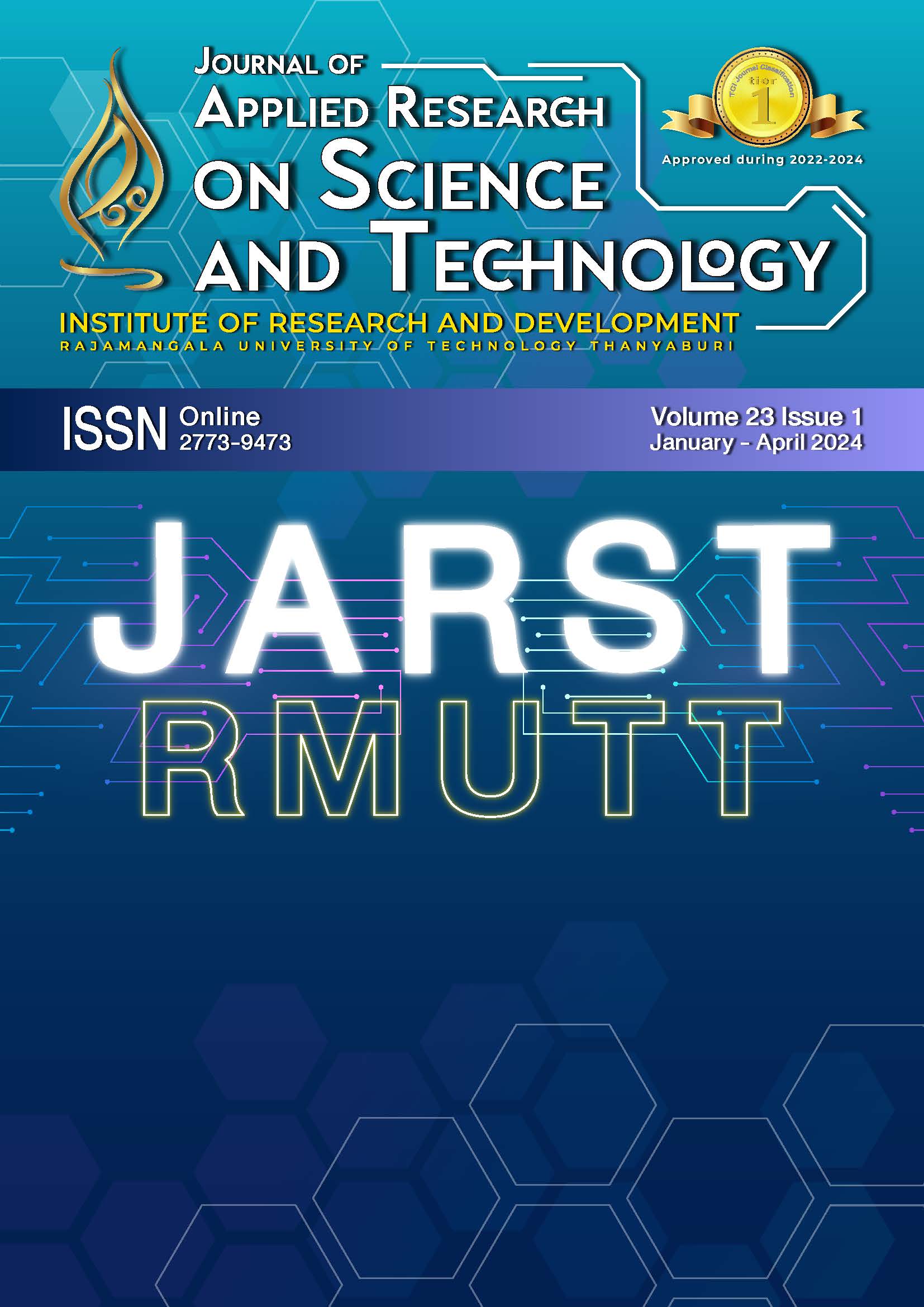Efficiency of wastewater treatment from environmental laboratory of science and technology, RMUTP using ozonation
Main Article Content
Abstract
Wastewater from the laboratory in the Division of Environmental Science and Technology, Faculty of Science and Technology, Rajamangala University of Technology Phra Nakhon is a source of pollution without any treatment. Researchers realized that it would become an environmental problem in the future. For this reason, wastewater treatment from water laboratory would be studied using ozonation process because the researchers want to use the existing equipment in the laboratory and a simple technique that the students can do. This aims to treat the wastewater until it passes the water standard. The laboratory's wastewater characteristics were unclear based on the study. The pH values measured were 8.15, 3.35, and 2.49, respectively. COD levels were monitored of 10,480, 2,400, and 3,040 mg/L, while the measured BOD values were 4,649, 1,683, and 2,200 mg/L, respectively. Additionally, the SS concentrations were 682, 788, and 548 mg/L, respectively. Because of these characteristics using only the biodegradation process didn’t work. The ozonation techniques were a good option following the research objective. The results showed that the suitable condition for the ozonation process was pH6 and the optimal time was 40 minutes. Because after 40 minutes the COD removal increase only 5% but after 60 minutes the ozonation had no effect on COD removal. This condition was applied before using biological treatment via a sequence batch reactor (SBR). Using microorganisms and 8 hours of aeration via SBR, the efficiency of COD BOD and SS removal was only 41.66, 0 and 71.82 percent, respectively. Filling ozone in rate 0.25 gram/hour/liter wastewater with SBR reactor, the wastewater treatment efficiency increased. It can remove COD, BOD and SS of 63.15, 50.00 and 72.63 percent, respectively. The advantage of this research was that the ozone generator can be applied for wastewater treatment without additional costs.
Article Details

This work is licensed under a Creative Commons Attribution-NonCommercial-NoDerivatives 4.0 International License.
References
Siyu C, Xiaomeng R, Gengbo R, Zizhang W, Zhimin W, Tiantong R, et al. Comparison of fenton and ozone oxidation for pretreatment of petrochemical wastewater: COD removal and biodegradability improvement mechanism. Separations. 2022;9(7):179.
Issaka E, Amu-Darko J, Yakubu S, Fapohunda FO, Ali N, Bilal M. Advanced catalytic ozonation for degradation of pharmaceutical pollutants―A review. Chemosphere. 2021;289:133208.
Jing Z, Shuo-Jing Z, Chun L, Jia-Ze S, Xiao-Xuan C, Lei Z, et al. Influence of industrial wastewater quality on advanced treatment of microbubble ozonation. Huan Jing Ke Xue. 2020;41(4):1752-60.
Jianlong W, Hai C. Catalytic ozonation for water and wastewater treatment: Recent advances and perspective. Sci Total Environ. 2020;704:135249.
Al-Khashman OA. Chemical evaluation of Ma’an sewage effluents and its reuse in irrigation purposes. Water Resour Manage. 2009;23:1041-53.
American Public Health Association (APHA). American Water Works Association, Water Environment Federation, Standard methods for examination of water and wastewater. 21st ed. Washington DC: USA; 2005.
Cañizares P, Lobato J, Paz R, Rodrigo MA, Sáez C. Advanced oxidation processes for the treatment of olive-oil mills wastewater. Chemosphere. 2007;67:832-8.
Chun-du W, Jin-yu C, Ning L, Cheng-wu Y. Ozone oxidation of photographic processing wastewater in a batch reactor. Int J Plasma Environ Sci Technol. 2007;11(2):135-40.
Kishimoto N, Morita Y, Tsuno H, Yasuda Y. Characteristics of electrolysis, ozonation and their combination process on treatment of municipal wastewater. Water Environ Res. 2007;79(9):1033-42.
Announcement of the Ministry of Natural Resources and Environment on setting control standards Announcement of wastewater drainage from certain types and sizes of buildings, dated 7 November 2005, announced in the Royal Gazette, Volume 122, Section 125D.
Mohamed HA, Ahmad ZA. Mechanism and reaction kinetic of hybrid ozonation-ultrasonication treatment for intensified degradation of emerging organic contaminants in water: A critical review. Chemical Engineering and Processing-Process Intensification. 2020;154(19):108047.
Mohamed S, Biological and Chemical Wastewater Treatment Processes, Wastewater Treatment Engineering, Intech Open. 1st ed. Cairo: Egypt; 2015.


